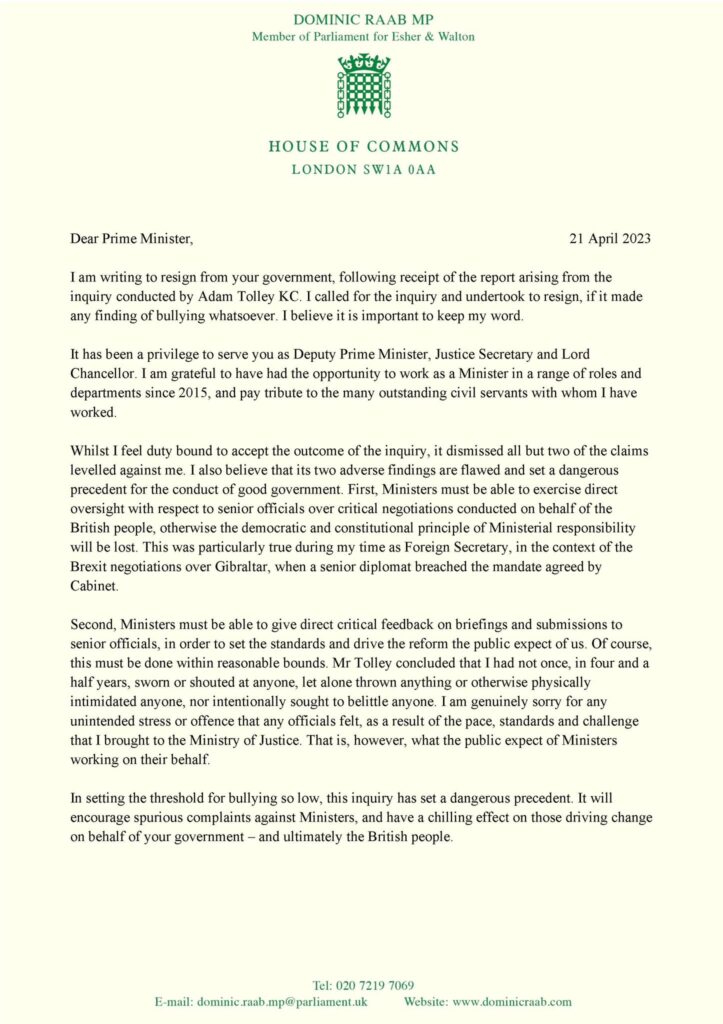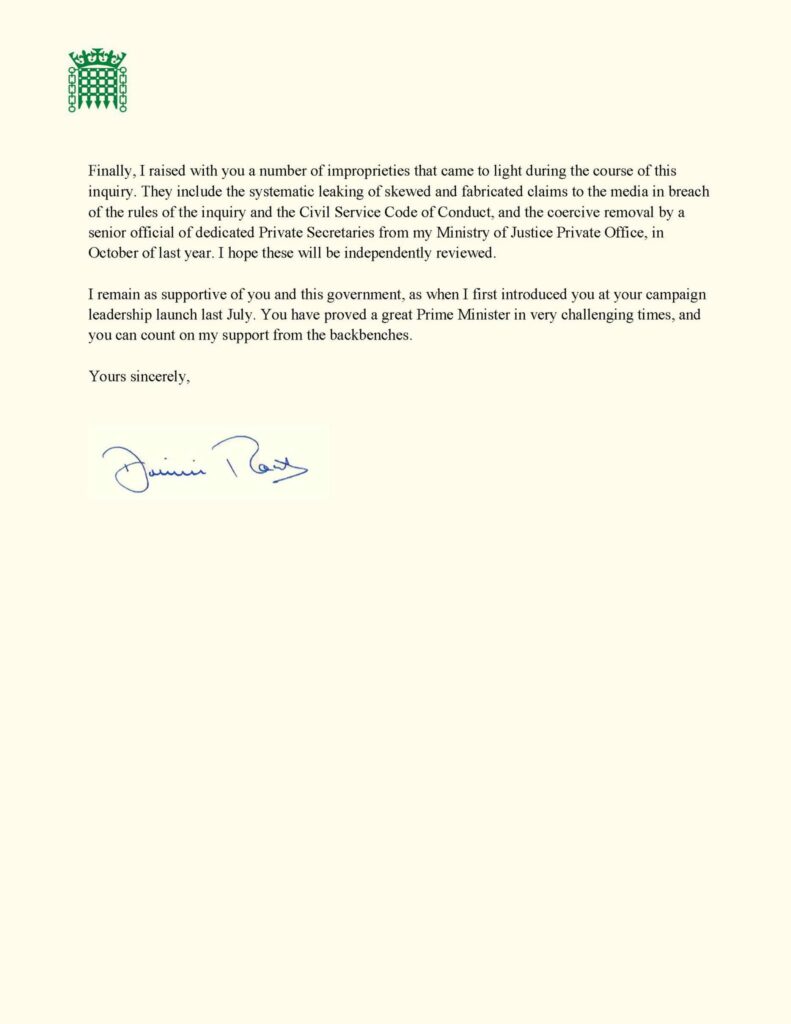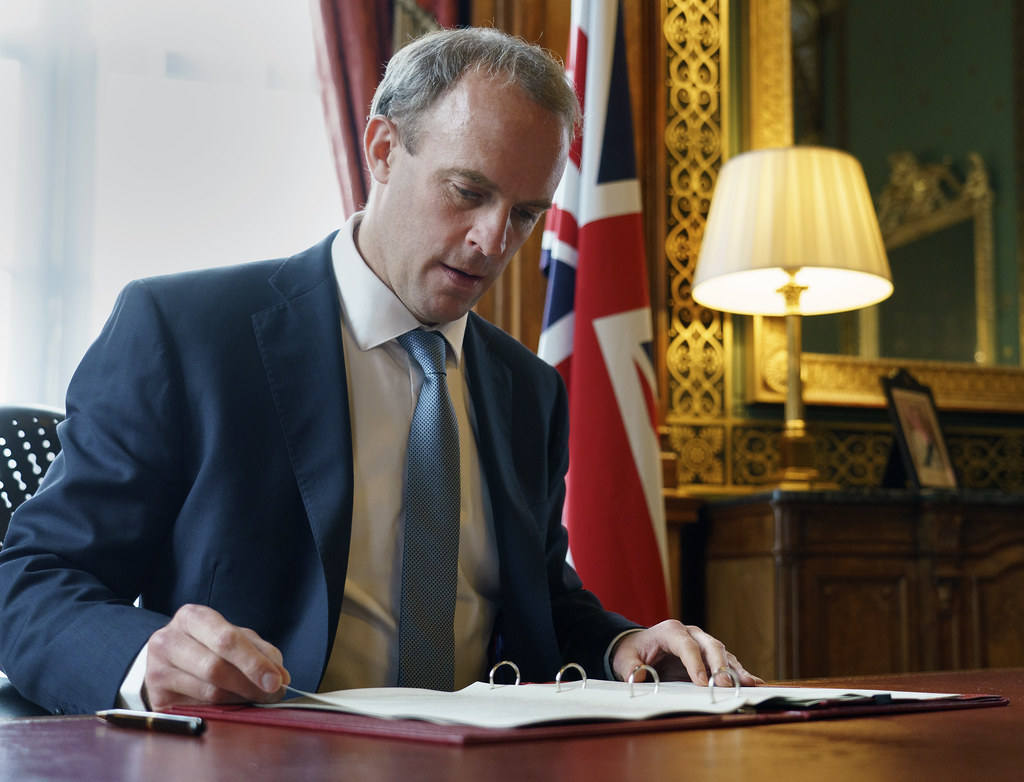21 APRIL 2023 | NEWS
Deputy Prime Minister and Justice Secretary Dominic Raab has tendered his resignation to Prime Minister Rishi Sunak and left the Government early this morning, following a report into whether he exhibited bullying behaviour towards officials while in office.
In doing so, Mr Raab said he felt “duty-bound” to accept the inquiry’s findings, though he added that all but two of the claims against him had been dismissed. He added that he found the inquiry’s process and findings to be flawed, and warned of a “dangerous precedent for the conduct of good government”.
Mr Raab has been replaced as Secretary of State for Justice by Alex Chalk, while Oliver Dowden has replaced him as Deputy Prime Minister. His full resignation letter can be read here:


In an interview with the BBC today, Mr Raab responded to a question as to whether he was “a nightmare to work for” by saying that there was “a very small minority of very activist Civil Servants” who were refusing to co-operate with the Government’s mandate. He further stated that those involved shared a “passive-aggresive culture”, adding that this was “not on” and “not democratic”.
“If you’ve got particularly activist Civil Servants, who either because they’re over-unionised or just don’t agree with what we’re trying to pursue … if actually, they block reforms or changes through a rather passive-aggressive approach, we can’t deliver for the British people,” he said.
“Of course, I don’t want to upset anyone and I made clear that I’m sorry for that. But that’s not bullying, and we can’t deliver for the British people if the bar is that low.
“If it’s not intentional, if it’s not personalised, if actually it is right, but there are some subjective hurt feelings by some, I’m afraid that makes it very difficult to deliver,” he added.
In response, a number of MPs from the governing Conservative Party have expressed to the press their solidarity with Mr Raab. One former Cabinet Minister said that while he may be “prickly and impatient” at times, they had “never seen any evidence of maliciousness” and that there was “lots of sympathy” for him.
Backbench Conservative MP Ben Bradley told journalists: “I agree with what [Raab] said in his letter that if Civil Servants are able to force people out whenever they want, Ministers will no longer be able to direct departments.
“It already feels in many areas of civil society that it’s unelected people ruling the roost rather than those who are elected to decide, and perhaps here’s another example. In future, if you disagree with a Minister, just stick a complaint in and get rid of him!”
Another Tory backbencher, Joy Morrissey, wrote on Twitter: “Sadly, we now live in a country where the definition of bullying includes telling someone to do their job. Where the slightest upset or annoyance is indulged with endless reports and inquiries.”
But the FDA trade union, which is among those representing Civil Servants, accused Mr Raab of “dangerous conspiracy theories that undermine the impartiality and integrity of the Civil Service”, adding that these were designed to “deflect from an independent investigation’s criticism of his conduct”.
And a former senior Civil Servant who had worked closely with Mr Raab in the past told the press: “I think you’d struggle to find a similar example of the dysfunction we’ve heard about in Tolley’s report, so it’s perhaps fair to draw the conclusion that there is one common thread to this unique situation, and that’s Raab.”
Speaking to Civil Service World, one source described Mr Raab’s resignation letter as “the most bullying” they had ever read, while another said they were “hugely relieved that the multiple voices have been heard, and that this wasn’t another whitewash”.
In response to the inquiry, carried out by senior lawyer Adam Tolley KC, Labour’s deputy leader Angela Rayner attacked the Prime Minister personally, saying on LBC Radio that: “Rishi Sunak’s response was appalling as a leader. He is not a leader; he is weak and he should have taken this as a serious allegation that has been upheld by a KC who investigated it.
“He should have been very clear and unequivocal this is unacceptable and he should have gone and he should not have appointed him in the first place.”
In his own defence, Mr Raab has written in The Telegraph that evidence had been stored up over time to be used against him, fuelled by leaks that he said were in breach of the Civil Service Code of Conduct. He further branded the procedures brought against him “improper”.
“This precedent sets the playbook for a small number of officials to target Ministers, who negotiate robustly on behalf of the country, pursue bold reforms and persevere in holding Civil Servants to account,” Mr Raab wrote. He also branded the process “Kafka-esque”, adding that the “normal rules of evidence and procedural fairness were disapplied”.
Responding to Mr Raab, the Prime Minister accepted his resignation with “great sadness”, writing that: “It is clear that there have been shortcomings in the historic process that have negatively affected everyone involved. We should learn from this how to better handle such matters in future.”
He also praised Mr Raab’s record as a former Foreign Secretary, referring to the UK’s “response to the undermining of human rights and democracy in Hong Kong” and the country’s “new independent sanctions regime”, as introduced by Mr Raab. He also mentioned the “reassurance and leadership” provided by Mr Raab when former Prime Minister Boris Johnson was hospitalised during the Covid pandemic.
As the MP for Esher and Walton, Mr Raab will now return to the backbenches.






















